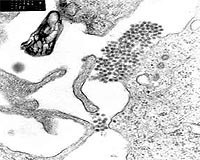 |
Milwaukee WI (SPX) Aug 31, 2010 A collaborative team of scientists led by researchers at The Medical College of Wisconsin, in Milwaukee, has used the tools of structural biology to understand how a synthetic chemical mimics abscisic acid (ABA), a key stress hormone that helps plants cope with adverse environmental conditions such as drought. The results are published online in Nature Structural and Molecular Biology in advance of print publication later. For years scientists have searched for practical ways to use ABA signaling to improve drought tolerance in agriculture. Unfortunately, the synthetic form of ABA used commercially is light sensitive and expensive. The new study builds on the earlier discovery by scientists at University of California, Riverside of pyrabactin, a synthetic chemical that mimics ABA. However, unlike ABA, pyrabactin activates only a few of the 14 ABA receptors in the plant needed for effective drought tolerance. "By better understanding how pyrabactin works, we can develop new chemicals to enable plants to resist drought. These same chemicals that signal the response to drought may also contribute to increasing crop yields," says Francis Peterson, Ph.D., lead author and assistant professor of biochemistry at the Medical College. An ABA receptor is a protein that functions as a molecular switch inside the cell. When an ABA molecule inserts into a cavity within the receptor, it sends a signal by changing the protein structure in a way that resembles the closing of a gate. To identify the specific atoms required for gate closure by ABA or pyrabactin, Dr. Peterson used X-ray diffraction to solve the three-dimensional structures of multiple receptor proteins. From the changes in position of only a few atoms, the research team discovered why pyrabactin can close the gate on some receptors but not others. "These insights suggest new strategies for modifying pyrabactin and related compounds so that they can mimic the signaling process of the naturally occurring ABA. This work has paved the way for manufacturing new molecules that activate or turn on receptors" said Sean Cutler, Ph.D., associate professor of plant cell biology at UC Riverside. "The current research is an important step on the way to what is likely to be the next big result: an ABA-mimicking chemical that can be applied to corn, soy bean and other crops," explained Dr. Peterson. In addition to Drs. Peterson and Cutler, research collaborators included Brian Volkman, Ph.D., Davin R. Jensen and Joshua J. Weiner of the Medical College of Wisconsin; as well as Sethe Burgie, Craig A. Bingman and George N. Phillips, Jr. of the University of Wisconsin-Madison; and Sang-Youl Park and Chia-An Chang of UC Riverside. An NIH grant for structural genomics supported the work in the Volkman lab at the Medical College, and a grant from the National Science Foundation supported Cutler's contribution to the study. "The project described was supported by the National Institutes of Health. The content is solely the responsibility of the authors and does not necessarily represent the official views of the National Institutes of Health."
Share This Article With Planet Earth
Related Links Medical College of Wisconsin Farming Today - Suppliers and Technology
 Malaysia mulls landmark trial of GM anti-dengue mosquitoes
Malaysia mulls landmark trial of GM anti-dengue mosquitoesKuala Lumpur (AFP) Aug 29, 2010 Malaysia is considering releasing genetically modified mosquitoes designed to combat dengue fever, in a landmark field trial that has come in for criticism from environmentalists. In the first experiment of its kind in Asia, 2,000-3,000 male Aedes aegypti mosquitoes would be released in two Malaysian states in October or November. The insects in the study have been engineered so that th ... read more |
|
| The content herein, unless otherwise known to be public domain, are Copyright 1995-2010 - SpaceDaily. AFP and UPI Wire Stories are copyright Agence France-Presse and United Press International. ESA Portal Reports are copyright European Space Agency. All NASA sourced material is public domain. Additional copyrights may apply in whole or part to other bona fide parties. Advertising does not imply endorsement,agreement or approval of any opinions, statements or information provided by SpaceDaily on any Web page published or hosted by SpaceDaily. Privacy Statement |